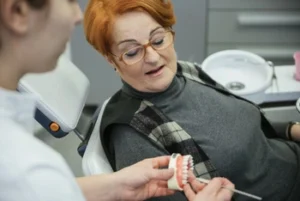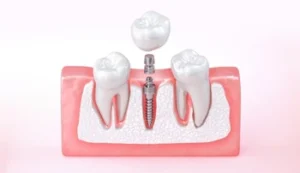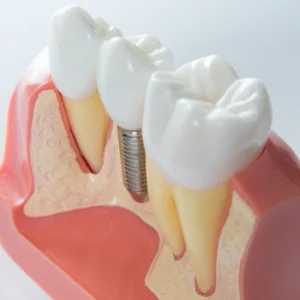
- Harris Dental Boutique
- Dental Implant Procedure, dental implant surgery, Importance of Dental Implants
- Dental Implants
Losing a dental implant can be unsettling, especially if it happens suddenly while eating or cleaning your teeth. You might feel unsure whether it’s an emergency or if the issue can wait for your next appointment. A dental implant fell out for various reasons, and understanding what’s normal versus what’s concerning makes a significant difference. Whether it’s just the crown or the entire implant, quick action and professional attention are key. Let’s look at why it can occur, what to do immediately, and how to protect your future oral health.
Understanding Why a Dental Implant Might Fall Out
When a dental implant becomes loose or dislodged, it’s usually linked to bone or gum changes beneath the surface. Recognising what leads to implant instability helps you respond calmly and avoid unnecessary worry.
 Distinguishing between a loose crown and a failed implant
Distinguishing between a loose crown and a failed implant
Sometimes, what feels like an implant coming loose is only the crown or dental abutment separating from the screw below. The dental implant screw or abutment screw may still be secure in the jaw bone. In such cases, the crown can often be reattached without a new implant procedure. However, if the entire implant part feels mobile, it may point to early implant failure requiring prompt care.
Early warning signs before a dental implant becomes unstable
Implant patients often notice subtle symptoms before full movement occurs. A clicking sound, swelling, or pressure around the implant may signal inflammation or bone loss. Persistent gum tenderness or slight wobbling indicates that something beneath the surface needs review. Addressing these signs early helps preserve healthy gums and surrounding bone.
Common biological and mechanical causes of implant loss
A loose dental implant can result from gum disease, poor oral hygiene, or excessive pressure during chewing. Smoking, uncontrolled diabetes, or other medical conditions like rheumatoid arthritis may interfere with bone healing. Mechanical causes include a damaged implant screw, improper bite alignment, or stress from teeth grinding. Identifying the underlying reason allows your implant dentist to decide whether replacement or repair is needed.
How bone support and gum health influence long-term stability
Healthy gums and strong bones are essential for holding surgically implanted tooth implants in place. Infections or gum disease weaken the surrounding bone, reducing its ability to anchor the implant firmly. Regular dental care and maintaining good oral hygiene prevent these tissues from deteriorating. Without intervention, visible bone loss can develop and lead to complete implant failure.
What to Do Immediately After a Dental Implant Falls Out
If your dental implant falls out, remaining calm and protecting the area is crucial. Immediate care reduces the chance of infection and keeps the surrounding tissue in good condition until your dentist can examine it.
Handling the fallen dental implant or crown correctly
If the entire implant falls, keep it clean and store it in a clean container. Do not attempt to place it back in the mouth. For just the crown or healing abutment, wrap it in a tissue and bring it to your dental appointment. Avoid touching the implant screw or cover screw directly to protect against contamination.
Protecting the exposed site until your dental appointment
Rinse gently with warm salt water to keep the site clean. Avoid brushing directly over the area and resist chewing on that side. Soft foods minimise irritation around the implant site. If you notice bleeding or swelling, apply a cool compress outside the cheek to ease discomfort until reviewed.
Recognising when discomfort signals a dental emergency
If you experience severe pain, swelling, or bleeding that doesn’t subside, it may indicate infection or tissue trauma. Call your dentist as soon as possible for urgent care. Any exposed area in the mouth following implant loss is vulnerable to bacteria, so delaying treatment can complicate the healing process.
How Dentists Assess and Manage Implant Failure
When a dental implant falls out, a professional assessment determines whether the issue involves the implant crown, abutment, or entire fixture. Understanding this process helps patients feel informed and prepared.
 Initial clinical checks and imaging to locate the problem
Initial clinical checks and imaging to locate the problem
During your appointment, your implant dentist examines the site to identify which part has moved. X-rays or scans help assess bone quality and check if the implant screw or dental abutment remains intact. These tests reveal whether the surrounding bone can still support a new implant.
Identifying infection, bone loss, or improper healing after dental implant surgery
In some cases, bacteria trapped around the implant after dental implant surgery can cause infection. Gum disease or inadequate healing may also weaken attachment to the bone. If visible bone loss or inflammation is detected, treatment focuses on cleaning and restoring tissue health before replacement.
When bone grafting or replacement may be required
If the implant site has lost density or height, bone grafting might be necessary to rebuild structure. This process strengthens the jaw bone for a future implant procedure. Patients with good overall health and healthy gums often achieve excellent recovery once bone and tissue heal properly.
Typical healing process and follow-up after treatment
After treatment, the healing process varies depending on the cause. A healing abutment may be placed temporarily to protect the site. Regular follow-up visits confirm that the surrounding bone is rebuilding correctly. Once the area stabilises, your dentist can fit a new implant crown or complete a full replacement as needed.
Preventing Future Implant Problems and Supporting Long-Term Success
Once the immediate issue is resolved, your care routine determines how well the implant lasts. Preventive attention supports stability and reduces the risk of another dental implant failure.
Daily oral hygiene routines for implant maintenance
Maintaining good oral hygiene prevents plaque buildup around the implant site. Brush twice daily with a soft toothbrush and use interdental brushes to reach tight spaces. Good oral hygiene habits keep your gums firm and protect against infection that could loosen future implants.
Avoiding biting habits and foods that increase implant strain

Regular dental check-ups to detect initial signs of movement or wear
Routine dental check-ups allow your dentist to examine the entire implant system. Early adjustments prevent small issues from turning into structural problems. Ongoing dental care supports stable, artificial teeth that look and function naturally for years.
Regaining Confidence with Expert Implant Care
If your dental implant falls out, timely attention can make recovery straightforward and effective. Replacing or repairing an implant requires skill and an understanding of the surrounding bone and gums. Our dental team can assess the cause, stabilise the area, and guide you through each step of the implant procedure. Whether it involves repositioning, bone grafting, or fitting a new abutment screw, we’ll support your healing with close follow-up and personalised care. Get the best dental treatment in Bundaberg to improve your oral health care.
Note: Any surgical or invasive procedure carries risks. Before proceeding, you should seek a second opinion from an appropriately qualified health practitioner.
References:
https://www.fda.gov/medical-devices/dental-devices/dental-implants-what-you-should-know
https://www.mayoclinic.org/tests-procedures/dental-implant-surgery/about/pac-20384622



 Distinguishing between a loose crown and a failed implant
Distinguishing between a loose crown and a failed implant Initial clinical checks and imaging to locate the problem
Initial clinical checks and imaging to locate the problem

